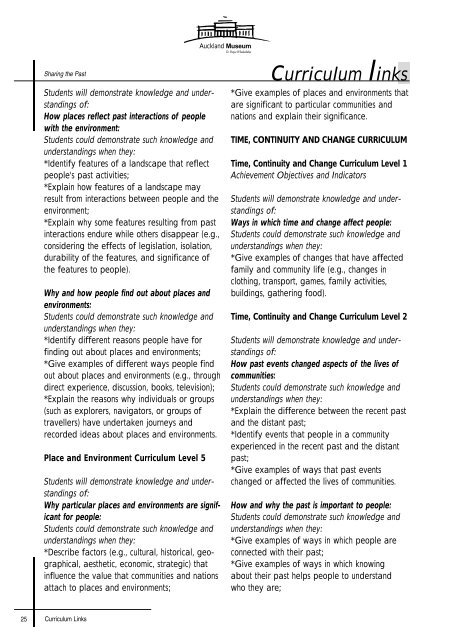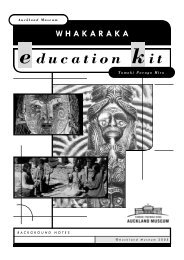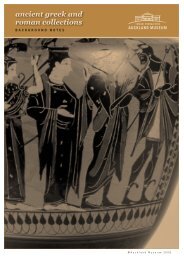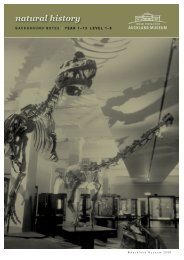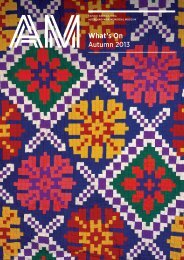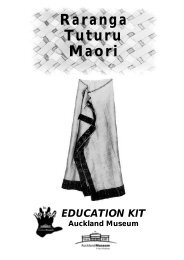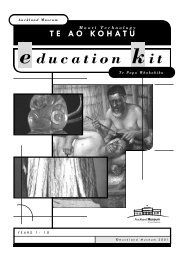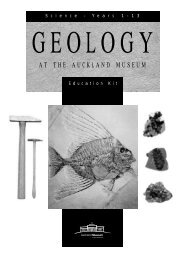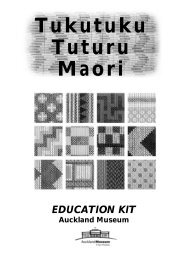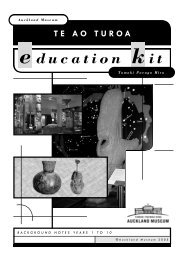You also want an ePaper? Increase the reach of your titles
YUMPU automatically turns print PDFs into web optimized ePapers that Google loves.
Sharing <strong>the</strong> Past<br />
Students will demonstrate knowledge and understandings<br />
of:<br />
How places reflect <strong>past</strong> interactions of people<br />
with <strong>the</strong> environment:<br />
Students could demonstrate such knowledge and<br />
understandings when <strong>the</strong>y:<br />
*Identify features of a landscape that reflect<br />
people's <strong>past</strong> activities;<br />
*Explain how features of a landscape may<br />
result from interactions between people and <strong>the</strong><br />
environment;<br />
*Explain why some features resulting from <strong>past</strong><br />
interactions endure while o<strong>the</strong>rs disappear (e.g.,<br />
considering <strong>the</strong> effects of legislation, isolation,<br />
durability of <strong>the</strong> features, and significance of<br />
<strong>the</strong> features to people).<br />
Why and how people find out about places and<br />
environments:<br />
Students could demonstrate such knowledge and<br />
understandings when <strong>the</strong>y:<br />
*Identify different reasons people have for<br />
finding out about places and environments;<br />
*Give examples of different ways people find<br />
out about places and environments (e.g., through<br />
direct experience, discussion, books, television);<br />
*Explain <strong>the</strong> reasons why individuals or groups<br />
(such as explorers, navigators, or groups of<br />
travellers) have undertaken journeys and<br />
recorded ideas about places and environments.<br />
Place and Environment Curriculum Level 5<br />
Students will demonstrate knowledge and understandings<br />
of:<br />
Why particular places and environments are significant<br />
for people:<br />
Students could demonstrate such knowledge and<br />
understandings when <strong>the</strong>y:<br />
*Describe factors (e.g., cultural, historical, geographical,<br />
aes<strong>the</strong>tic, economic, strategic) that<br />
influence <strong>the</strong> value that communities and nations<br />
attach to places and environments;<br />
25 Curriculum Links<br />
<strong>Auckland</strong> <strong>Museum</strong><br />
Te Papa Whakahiku<br />
curriculum links<br />
*Give examples of places and environments that<br />
are significant to particular communities and<br />
nations and explain <strong>the</strong>ir significance.<br />
TIME, CONTINUITY AND CHANGE CURRICULUM<br />
Time, Continuity and Change Curriculum Level 1<br />
Achievement Objectives and Indicators<br />
Students will demonstrate knowledge and understandings<br />
of:<br />
Ways in which time and change affect people:<br />
Students could demonstrate such knowledge and<br />
understandings when <strong>the</strong>y:<br />
*Give examples of changes that have affected<br />
family and community life (e.g., changes in<br />
clothing, transport, games, family activities,<br />
buildings, ga<strong>the</strong>ring food).<br />
Time, Continuity and Change Curriculum Level 2<br />
Students will demonstrate knowledge and understandings<br />
of:<br />
How <strong>past</strong> events changed aspects of <strong>the</strong> lives of<br />
communities:<br />
Students could demonstrate such knowledge and<br />
understandings when <strong>the</strong>y:<br />
*Explain <strong>the</strong> difference between <strong>the</strong> recent <strong>past</strong><br />
and <strong>the</strong> distant <strong>past</strong>;<br />
*Identify events that people in a community<br />
experienced in <strong>the</strong> recent <strong>past</strong> and <strong>the</strong> distant<br />
<strong>past</strong>;<br />
*Give examples of ways that <strong>past</strong> events<br />
changed or affected <strong>the</strong> lives of communities.<br />
How and why <strong>the</strong> <strong>past</strong> is important to people:<br />
Students could demonstrate such knowledge and<br />
understandings when <strong>the</strong>y:<br />
*Give examples of ways in which people are<br />
connected with <strong>the</strong>ir <strong>past</strong>;<br />
*Give examples of ways in which knowing<br />
about <strong>the</strong>ir <strong>past</strong> helps people to understand<br />
who <strong>the</strong>y are;


